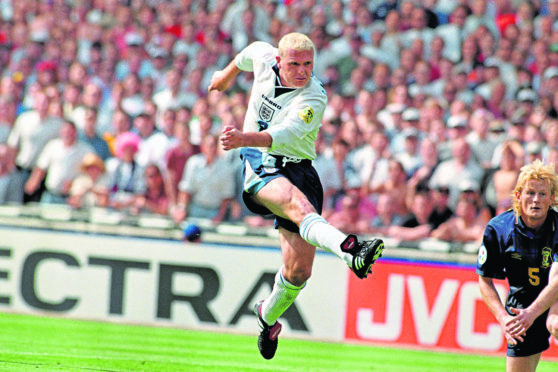It was Karl Marx who told us that history repeats itself, first as tragedy then farce, and that was one of my first thoughts last week when ITV announced its intention to show every match of the Euro 96 tournament during the summer.
With broadcasters struggling desperately to fill schedules left with a gaping void by the COVID-19 pandemic, it’s hardly surprising they are resorting to such measures. The BBC is already repeating old Scottish Cup ties, Sky is rehashing highlights of every Cricket World Cup and, in some cases, these companies are planning to add new commentary and punditry to events from the past.
But even though we are living in unprecedented times, this tactic is doomed to failure. Sport is so popular because it stirs the blood, titillates with anticipation, excels in unexpected twists and producing tales which encompass triumph and tristesse.
But, above all, it thrives on the element of surprise and the shock of the new. Every time we start watching a football international, golf major or rugby or cricket Test, there is always the sense that anything might happen, even when the odds suggest otherwise.
Remove that factor and what’s left? The equivalent of watching a hit movie a few years after it first arrived in cinemas and garnered Oscar or BAFTA nominations and sent shivers up the spines of viewers in darkened multiplexes. It may still be worth watching again, but please let’s not pretend it is anything other than another TV repeat.
And, in some cases, these transmissions will evoke the opposite of happy memories for many viewers. Take Euro 96, for instance. The competition where England hosted Scotland at Wembley and, as the visitors have never been allowed to forget, Paul Gascoigne was the catalyst for a sumptuous goal just a minute after David Seaman had saved Gary McAllister’s penalty.
It’s a contest seared on my mind, not least because I was in New Zealand at the time, and endured the sort of day which I wouldn’t wish on anybody.
In the afternoon, at Carisbrook in Dunedin, I watched Scotland’s rugby team concede 62 points against a rampant All Black ensemble, featuring such stellar talents as Jonah Lomu, Jeff Wilson and Christian Cullen. The tourists actually managed 31 points of their own, but it was a comprehensive reminder of Kiwi power and panache.
That tussle finished at around 4pm Down Under. Which meant it was another 10 hours before the football meeting of the Auld Enemies kicked off at 3pm in London – or 2am on Sunday morning in the Land of the Long White Cloud.
A few of us – Scots, English and British expatriates alike – sat through the proceedings with markedly contrasting emotions as the match unfolded. With hindsight, there was no denying the splendour of Gascoigne’s goal, but there’s the rub.
It has been shown so often in the last 24 years it now belongs in the same bracket of classic TV moments as the elephant which pooped on Blue Peter, Basil Fawlty and the Germans or Morecambe and Wise messing with Andre Preview…sorry, Previn.
Perhaps the broadcasters are hoping they will attract a younger audience, given the enforced cancellation of everything in the sporting calendar from the Olympics to the Grand National and the European [Football] Championships to the World Snooker Championship, which normally fill hundreds of hours of screen time.
But there’s a reason why historic moments stick in the mind. They were live, in the moment and provoked spontaneous outpourings of joy and despair. That’s also why sports films rarely succeed at the box office.
Invictus might have been directed by Clint Eastwood and featured a starry cast, but they couldn’t hope to equal the sight of South African captain Francois Pienaar holding the 1995 Rugby World Cup next to Nelson Mandela. Once witnessed, never forgotten.
These aren’t normal times, of course. And some people are already prepared to watch football action from the Belarusian League to ease their withdrawal symptoms.
But live sport is a totally different ball game from repeats. And don’t forget the first man who painted Mona Lisa was a genius; the second was a forger!
